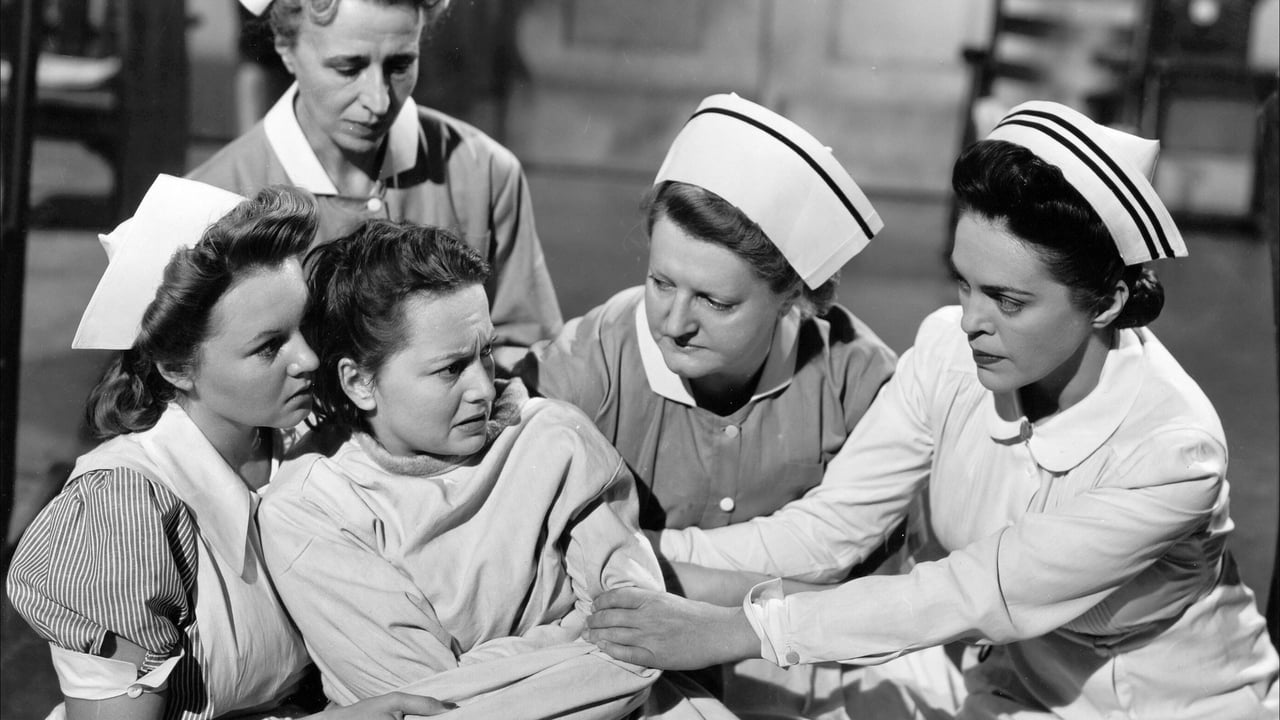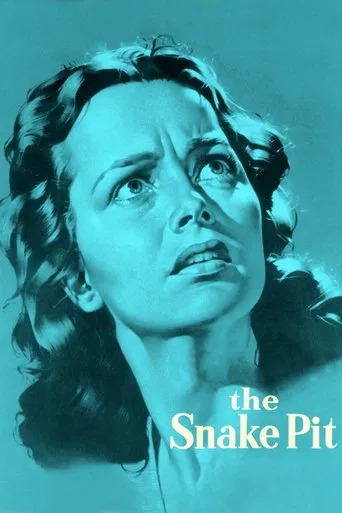

This was a film I found listed in the book 1001 Movies You Must See Before You Die, the title suggested nothing particular in a story or plot to me, but the leading actress was a good draw for me to watch as well, from Oscar nominated director Anatole Litvak (Anastasia). Basically Virginia Stuart Cunningham (Oscar nominated Olivia de Havilland) was an outwardly ordinary young woman, but all of the sudden she has found herself in Juniper Hill State Hospital, a mental institution, and she has no memory of how she got there. Through flashbacks we see that Virginia her courtship with Robert (Mark Stevens) in Chicago, they part for a short time before he moves to New York and they are reunited, she initially refuses marriage for some time, eventually they do get married, but soon after she begins to act erratically. Virginia's growing symptoms include her becoming apparently schizophrenic, hearing voices, and going into states of psychosis, going so out of touch with reality that she didn't recognise her husband. Dr. Mark Kik (Leo Genn) works with Virginia, putting her through torturous electric shock therapy and other forms of therapy including hypnotherapy, the mental hospital is organised on a spectrum of "levels", the better a patient gets the lower level will be achieved. In Level One however she encounters the cruel Nurse Davis (Helen Craig) who is jealous of Dr. Kik's professional interest and what she sees as excessive concern for Virginia, she is so severe with her that she drives Virginia into having an outburst that causes her to be expelled from the first level and being put into a straight jacket. This setback does not stop Dr. Kik, his car continues and Virgina's mental state does improve, over time Virginia gains insight and self- understanding, and through question tests she is able to remember personal information and facts she perhaps would not have before, in the end Virginia is finally able to leave the hospital to return to normal life. Also starring Celeste Holm as Grace, Glenn Langan as Dr. Terry, Leif Erickson as Gordon, Beulah Bondi as Mrs. Greer, Lee Patrick as Asylum Inmate, Isabel Jewell as Asylum Inmate, Victoria Horne as Asylum Inmate, Tamara Shayne as Asylum Inmate, Grace Poggi as Asylum Inmate, Howard Freeman as Dr. Curtis and Natalie Schafer as Mrs. Stuart. de Havilland is brilliant at being emotionally and mentally unstable, but also sympathetic and traumatised, this was really harrowing and extremely controversial film for its time, and it still remains so, seeing both the story of a woman having a nervous breakdown and the ways and methods of the hospital to cure her and other inmates, with highly emotional and traumatic scenes, and touching moments too, especially the inmates singing "Going Home", this film will definitely make an impact, a fantastic psychological drama. It won the Oscar for Best Sound, and it was nominated for Best Picture, Best Writing, Screenplay and Best Music for Alfred Newman. Very good!
... View MoreOlivia DeHavilland does a remarkable job in this film about a woman who suffers a nervous breakdown and can no longer function. She is placed in an asylum for the mentally deranged/disturbed. We are allowed inside the asylums of that day and see the day to day care of these patients.The acting is fantastic by everyone. Even the actors that have small parts. The direction great. Some of the dialog is of course dated as we don't talk like this anymore. Now we say "yeah, huh, what was that?" But here is a film that really drags you in to the scene. No mind-numbing CGI or computer graphics. This is gritty, hands on filmmaking. Olivia DeHavilland's facial expressions are perfect in every scene. She makes the best of everything she's given. Don't miss this one.
... View MoreThe Snake Pit The hardest part of diagnosing craziness in women is not accidentally making a blanket assessment of the entire sex.And while this drama doesn't put all women in padded cells, it does confine at least one.Rousing after a hysterical blackout, housewife Virginia (Olivia de Havilland) finds she's been admitted to a mental hospital where she's been diagnosed schizophrenic.Disorientated and frantic, Virginia is unable to remember the events leading up to her residency at the hospital.But overtime, psychotherapy and electric shock therapy help her recount the troublesome marital matters between her and her husband.And with each session she draws closer to escaping the maddening cries of her fellow patients.A pioneering perspective of the medieval practices of a 1940s mental institute, The Snake Pit is an artistic and an educational achievement.However, with free pills, free psychoanalysis and free pajamas, who's ever going to admit they're sane? Green Lightvidiotreviews.blogspot.com
... View MoreLet's hope clinical conditions have improved in the last 60 years. Because, if Virginia (de Havilland) wasn't crazy going in, she will be after staying there. Those day-room scenes are genuinely unnerving. The patients mill around like berserk billiard balls, each in an enclosed world, pursued by their own internal demons. Then there's Hester's (Betsy Blair) frozen stare that chilled me as a kid and still does. What terrible psychic injury is behind that fearful silence, and who will help overcome the unspoken torment.Yes, it's also a case for reform, but an effective one without being preachy. Hundreds of the afflicted are warehoused around an over-worked staff. No wonder nurses like Davis (a great Helen Craig) become petty tyrants, trying to keep some order. Sure, Dr. Kik (Genn) is idealized and so in her own way is Virginia. At first I thought that was nothing more than typical Hollywood pandering. But now I see the two as providing needed hope, given negative opinions of the day. With humane care there is hope for these folks. That's the point of the dance—some kind of normalcy struggling to come out. At the same time, it all comes together in that gut-wrenching "Goin' Home"— something like the choral expression of a human basic. Okay, probably some of the emotional load has caught me up. But not everything is roses. Mark Steven's understanding hubby really does go too far. Some mixed feelings about Virginia's chances would add a needed dimension. Also, the unprofessional finger-wagging looks contrived and unimaginative. I'm sure too that Kik's Freudianizing is subject to debate. And truth be told, it comes across as pretty facile. Nonetheless, the movie's well structured for overall impact. And thanks be to TCF for the supporting players who remain vivid and impressive. So, whatever the drawbacks, the movie still packs a humane message within a dramatic punch. One that can still be felt, even six decades later.
... View More